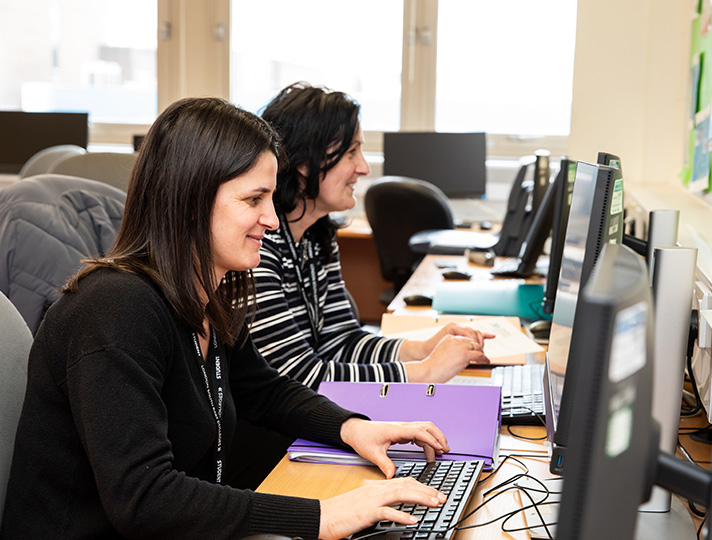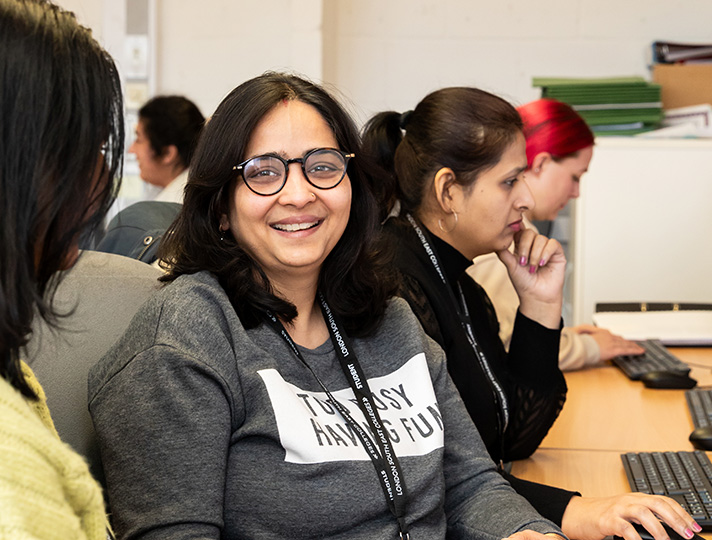-
What you will study
At Level 4: the programme has set of courses such as Computer Programming and Communication Systems to provide the students with a solid foundation needed to establish an understanding of Computing and Programming principles and concepts. On top of this, the courses build practical skills on the latest technologies giving our student an edge in an increasingly competitive job market. As many of these skills are also embedded and delivered in other courses, all graduates from all programmes are expected to achieve the threshold level in each of the skills listed.
At level 5, core courses offered such as Professionalism in the IT Industry and Database Applications Technology will develop business communication skills, critical awareness and critical thinking skills to a workplace situation, employability skills to vocational situations and an understanding of the role of the IT professional. Consequently all of the skills listed above will have been, to an appropriate extent, delivered and assessed during our programmes, and graduates will have demonstrated their achievement in these areas.
-
Entry Requirements
You should typically have at least one of the following meeting a minimum of UCAS points
- You will require a minimum of 48 UCAS points from a Level 3 qualification.
- Relevant BTEC (Pearson’s Edexcel) National Diploma/Certificate in IT or other IT related Level 3 qualification.
- Access to HE Computing, Business or computer related.
- International Baccalaurean qualification.
-
We will accept T Levels for entry onto our higher education courses, providing they meet our entry requirements Additional entry requirements
- Applicants with BTEC ND/NC or degrees in other areas will be considered.
- 5 GCSEs-grades A*-C/9-4 including English and Maths or equivalent qualification.
- You will be encouraged to form peer groups to share and discuss project ideas and workplace learning when not attending lectures, seminars, workshops or other timetabled sessions you will continue learning through self-study. If you do not have the above UCAS/GCSE requirements but you are a mature student, have appropriate experience, specific knowledge or industry-based qualifications, your application will be welcomed and still considered on case to case basis.
-
Assessment
Assessment is through examination, course work including essay and report writing, portfolio building, project work, oral assessment and presentation. All modules are graded as pass, merit or distinction. Students must pass each unit to get the overall Foundation Degree in Computing at the end of the programme.
-
Progression
On completion of the Foundation Degree in Computing, students can fast track to the 3rd year of the BSc(Hons) Degree in Computing, BSc (Hons) in Computer Science at University of Greenwich or pursue employment in the IT industry. A wide range of opportunities in computing and IT, including programming,
Networking and database systems administration-both in public and private sector.
-
Apply Now
-Apply Now via UCAS.COM -UCAS Code G405 -The university code for the University of Greenwich is G70 -For further information, please email HE@lsec.ac.uk
-
Module information
Level 4 - Year 1:
Programming Foundations (15 Credits) - The course presents the fundamental principles of computing using a standard programming language such as Java and Java Scripting, using both a plain text editor such as EditPlus and an interactive development environment such as NetBeans.
Object Oriented Programming (15 Credits) -The course presents the fundamental principles of computing using a standard object-oriente programming language such as Java, using both a plain text editor such as EditPlus and an interactive development environment such as NetBeans. Basic data types, operators and expressions. Compiling and running programs. Methods and parameter passing. Classes and objects. GUI programming. Selection and iteration. Arrays and collections. Exception handling. Simple I/O and database connectivity. Unit testing. Inheritance. Use of relevant online documentation (eg. JAVA API documentation).
Work-based learning project 1 (30 Credits) - You will be introduced to the software life cycle and the process models used to manage software projects. You will be able to appreciate and use software modelling techniques effectively through participating in the activities commonly found in real-world projects. You will be introduced to the basics of building software applications using appropriate tools and techniques.
Communication systems (15 Credits) - Communication systems are critical components that enable computing devices to be integrated in a distributed environment, permitting dispersed resources to be shared and facilitating applications to be distributed amongst a range of devices. To exploit the power and appreciate the limitations of these environments requires an understanding of the principles of communication systems and an appreciation of the range of techniques available that make possible communication between computing devices.
Computer systems and internet technologies (15 Credits) - You will be introduction to the importance of the Internet and its various aspects including the Web and email. The architecture of the Web, URL, web servers and HTTP. Practical introduction to HTML - creating Web pages incorporating media. HTML forms and basic use of client side scripting (such as JavaScript) for input validation. Introduction to client side, in terms of a simple Web-enabled Database.
Logical Foundations (15 Credits) - This module contains the logic and mathematical ideas needed to underpin a rigorous approach to computing. The emphasis will be on developing precise thinking, looking at modelling data and processes, introducing some reasoning techniques and investigating the use of statistics.
Analytical methods for computing (15 Credits) - This module teaches analytical skills and techniques needed to underpin a rigorous approach to computing. The emphasis will be on developing precise thinking, and analytical, modelling and algorithmic skills in the context of Computing. It extends the knowledge gained in Logical Foundations and give an introduction to discrete and continuous techniques.
Level 5 - Year 2:
Work-based learning project 2 (30 Credits) - Normally for work-based project will focus on a work-related issue. Students will be encouraged to develop a project closely linked to the subject focus of their programme. This module is closely link to Professionalism in the IT Industry and database Technology. Majority on the Work-based projects are link to workplace situations.
Application and web development (15 Credits) - This course will allow the students to build on their basic programming to learn to make effective use of an industrially relevant object-oriented programming language (such as Microsoft C#.NET). Programming techniques will be taught following a problem solving, case-study based approach to learning programming skills.
Database application technologies (15 Credits) - You will be introduced to the necessary knowledge and skills to analyse data, design and build solutions for business problems using various tools and techniques for developing a database system that positively contribute to the success of running a business and enabling it to achieve its mission and objectives. In the lab sessions you will learn how to develop a database system using tools provided by the chosen DBMS such as SQL. There will also be self-study time mainly on SQL supported by online learning materials.
Information analysis (15 Credits) - You will be introduced to business functions; information required by business functions; elements of data and information; the need for quality systems and decision making; the effects of poor quality data and information; managing and improving quality systems; presentation of information; production of quality information; use of appropriate software to build a quality information system.
Principles of security (15 Credits) - Issues, threats and their impact on a business environment
Risk Management: Identification and analysis techniques as well as control strategies.
Business Continuity: Contingency planning and disaster recovery planning. Compliance with standards/the law/regulatory framework such as Information Security Policy: ISO27001 all sections, Computer Misuse legislation (UK, USA). Professional and ethical codes of conduct: ACM, BCS, etc.
Access to Higher Education (lsec.ac.uk)Professionalism in the IT industry (15 Credits) - In this module you will be introduced to employability skills, understanding IT careers, preparing for job hunting, developing a career plan. Critical reading and note-making, critical thinking, analytical writing. Understanding business communications, communicating effectively in writing and the role of the IT professional, professional bodies.
Network and operating systems (15 Credits) - In this module you will be introduced to Operating Systems - Windows 7, LINUX (UNIX). Objectives and function of modern operating systems. Deadlock and scheduling algorithms, Virtual Memory, paging strategies, multiprogramming. Functionality of typical O/S. Design issues (efficiency, robustness, flexibility, portability, security, compatibility). Influences of security, networking.
-
Cost and Loans
You can apply for a student loan for this course.
Although we aim to minimise any additional costs to students over and above the course tuition fee, there will be some additional costs which students are expected to meet these include:
-
Text books
-
Travel to other sites - Where required
-
Library Fees and Fines - If you fail to return loaned items within the required time you will be responsible for the cost of any fees or fines applicable
-
Printing and photocopying - Ypu will need to cover the cost of any printing or photocopying undertaken to support your learning
- Graduation ceremonies - It is free for you to attend the ceremony itself. Guest tickets and robe hire / photography are additional costs payable by you.
-
-
Learning and Teaching
You will be taught through a combination of lectures, seminars and practical workshops. This course will be taught by a mixture of formal lectures, classroom-based tutorials, laboratory sessions and working through case studies both individually and as a member of a team. The course will be supported by many directed unsupervised learning activities and a logbook containing both examples of set work and reflective reviews. For work-based learning modules learners will be essentially self-managed and supported by tutors. Support will be negotiated as part of the Learning Contract. Students will be encouraged to form peer groups to share and discuss project ideas and workplace learning when not attending lectures, seminars, workshops or other timetabled sessions you will continue learning through self-study. Typically, this involves reading journal articles and books, undertaking research in the library, working on projects, and preparing for coursework assignments/examinations, workshops and seminars.
-
Contact Hours
You will typically have around 15 contact hours per week.
You will be encouraged to form peer groups to share and discuss project ideas and workplace learning when not attending lectures, seminars, workshops or other timetabled sessions you will continue learning through self-study.
-
Academic Input
All students have access to University of Greenwich seminars and workshops for Computing.
Events
-
May 13
Apprentice Information Event6PM-7PM
Bromley Campus
-
May 20
Apprentice Information Event6PM-7PM
Bexley Campus
-
Jun 24
Bexley Open Event5PM-7PM
Bexley Campus
-
Jun 24
Holly Hill Open Event5PM-7PM
Holly Hill Construction Skills Campus
-
Jun 25
Bromley Open Event5PM-7PM
Bromley Campus
-
Jun 25
Orpington Open Event5PM-7PM
Orpington Campus
Where can it lead?
Find out more about the jobs available once you have successfully completed a course in this area.
Our Courses
Take a look at our wide range of affordable employment-focused higher education courses.
Fees and funding
We want to help you get the very best out of your studies with us and understand that financial issues can be a concern.
Why study with us
We blend academic and vocational learning so you will gain the skills employers want and the confidence you need to start or advance in your chosen career.





